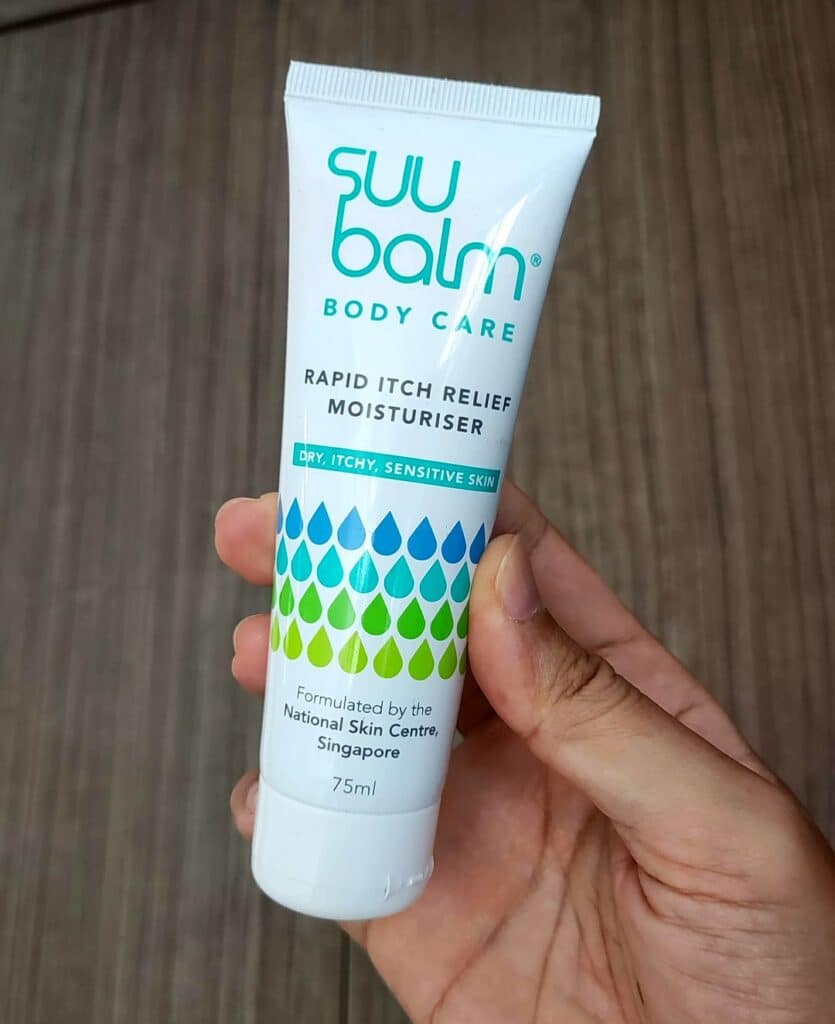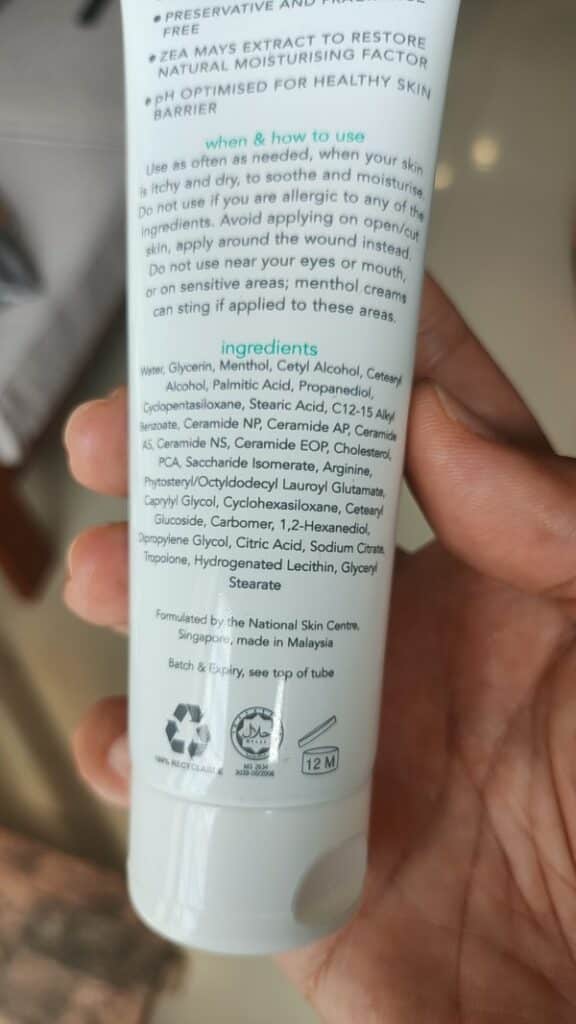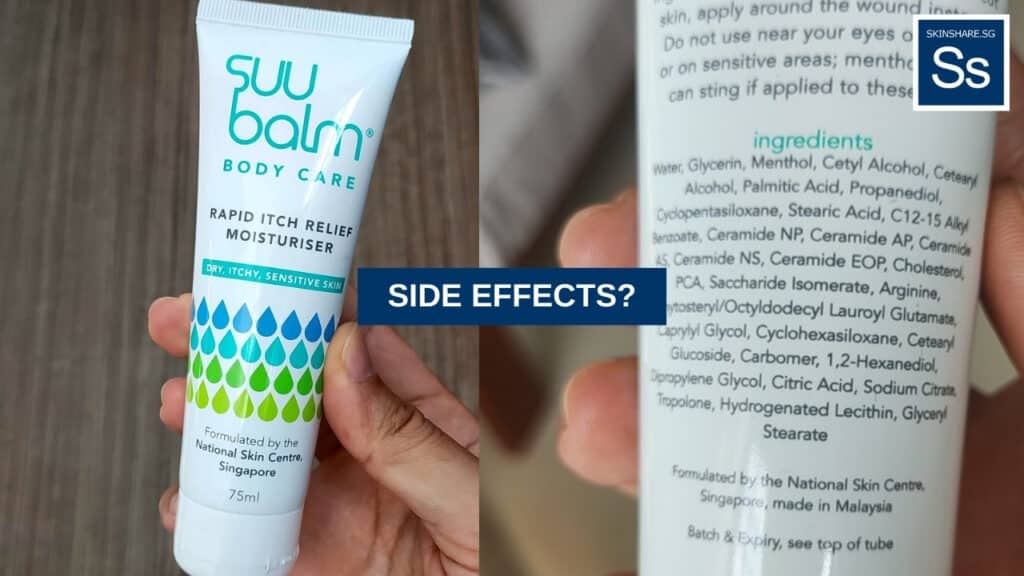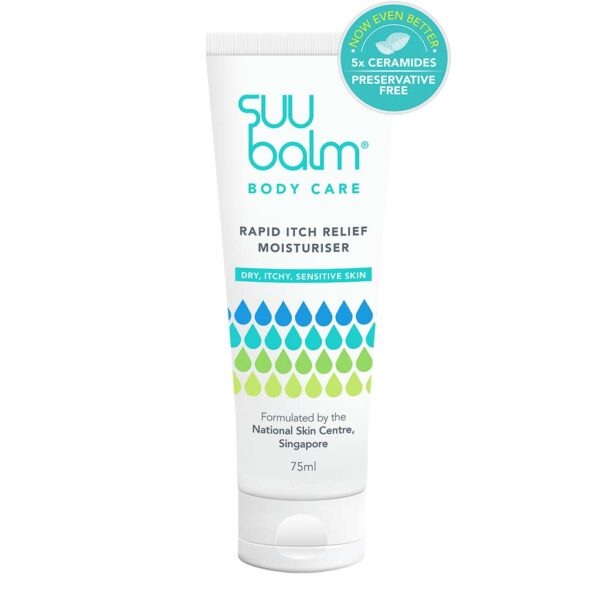Over the last few years, you would have seen this product pop up in Watsons, Guardian and Unity. They ran roadshows, online ads, and rapidly gained popularity among Singaporeans.
I too am a regular user of Suu Balm’s Rapid Itch Relief Moisturiser. And not just for my eczema. My kids have started to wake up in the middle of the night complaining of dry itchy legs, and this lotion has helped them fall back asleep again. It also works to soothe the itch from mosquito bites.
But people with eczema-prone skin will need to use this lotion a lot more often than just the occasional mosquito bite. With such frequent usage, it got me thinking, what is actually in this stuff that makes it work? And should I be applying it so often?

What ingredients are in Suu Balm Rapid Itch Relief Moisturiser?
According to their website, Suu Balm Rapid Itch Relief Moisturiser contains the following:
Water, Glycerin, Menthol, Cetyl Alcohol, Cetearyl Alcohol, Palmitic Acid, Propanediol, Cyclopentasiloxane, Stearic Acid, C12-15 Alkyl Benzoate, Ceramide NP, Ceramide AP, Ceramide AS, Ceramide NS, Ceramide EOP, Cholesterol, PCA, Saccharide Isomerate, Arginine, Phytosteryl/Octyldodecyl Lauroyl Glutamate, Caprylyl Glycol, Cyclohexasiloxane, Cetearyl Glucoside, Carbomer, 1,2-Hexanediol, Dipropylene Glycol, Citric Acid, Sodium Citrate, Tropolone, Hydrogenated Lecithin, Glyceryl Stearate

Will Suu Balm have side effects for eczema skin?
Let’s breakdown what each is used for, and whether it will give any side effects:
- Water: Water serves as the base for the lotion, providing a hydrating and solvent medium for other ingredients. It helps to moisturize and deliver the active ingredients to the skin.
- Glycerin: Glycerin is a humectant that attracts and retains moisture in the skin, helping to keep it hydrated and prevent dryness. It is generally well-tolerated and has few side effects.
- Menthol: Menthol provides a cooling and soothing sensation, which can help relieve itching and provide a refreshing feeling on the skin. It was also found to improve wound healing. Originally found in mint plants (e.g. peppermint), it’s now usually formulated in a lab. As per the instructions, it’s not advised to apply it on open/cut skin. If you have broken skin during a flareup, it will sting when applied, and the cooling sensation may feel more like a burning sensation.
- Cetyl Alcohol and Cetearyl Alcohol: These fatty alcohols act as emollients and thickeners in the lotion, helping to give it a creamy texture. They also provide a moisturizing effect. Generally, these alcohols are well-tolerated and not known to cause significant side effects.
- Palmitic Acid and Stearic Acid: These are fatty acids that can act as emollients and skin-conditioning agents. They help to soften and smooth the skin. They are typically safe and well-tolerated.
- Propanediol: Propanediol is a solvent and humectant that helps improve the spreadability of the lotion and maintain skin moisture. It is generally considered safe and non-irritating.
- Cyclopentasiloxane and Cyclohexasiloxane: These silicones serve as emollients, providing a silky texture to the lotion and helping it spread easily. They can temporarily smooth the skin’s surface and may be well-tolerated by most individuals.
- C12-15 Alkyl Benzoate: This ingredient functions as an emollient, improving the texture and spreadability of the lotion. It can help the product feel less greasy and is generally safe for most skin types.
- Ceramides (Ceramide NP, Ceramide AP, Ceramide AS, Ceramide NS, Ceramide EOP): Ceramides are lipids naturally found in the skin’s barrier. They help to restore and maintain the skin’s protective barrier, preventing moisture loss and protecting against irritants. There are typically no side effects associated with ceramides, and they are well-suited for sensitive skin.
- Cholesterol: Cholesterol is another lipid that helps support the skin’s barrier function and maintain moisture. It is generally safe and well-tolerated.
- PCA: PCA (pyrrolidone carboxylic acid) is a humectant that helps to attract and retain moisture in the skin. It is usually safe and non-irritating.
- Saccharide Isomerate: This ingredient is a moisturizing agent that helps to bind water to the skin, providing long-lasting hydration. It is considered safe and suitable for sensitive skin.
- Arginine: Arginine is an amino acid that may help improve skin hydration and overall skin health. It is typically well-tolerated and safe for use in skincare products.
- Phytosteryl/Octyldodecyl Lauroyl Glutamate: This ingredient likely serves as an emollient and skin-conditioning agent, helping to improve the feel of the lotion on the skin. It is generally safe for most skin types.
- Caprylyl Glycol, Cetearyl Glucoside, Carbomer, 1,2-Hexanediol, Dipropylene Glycol, Citric Acid, Sodium Citrate, Tropolone, Hydrogenated Lecithin, and Glyceryl Stearate: These ingredients have various functions, including serving as preservatives, stabilizers, emulsifiers, and pH adjusters. They are typically used to maintain the product’s stability and safety. They are generally safe when used as directed and in appropriate concentrations.
Based on the above, there are generally no adverse side effects from using Suu Balm moisturiser. However, as mentioned above, the cooling effect of menthol may feel more like pain or burning, if you happen to apply it on broken skin.
Remember that individual skin reactions can vary, and it’s advisable to perform a patch test before using any new skincare product, especially if you have sensitive or allergy-prone skin. If you experience any adverse reactions or side effects such as redness, itching, or breakouts, discontinue use and consult a dermatologist or healthcare professional.
Where to buy Suu Balm online in Singapore
Suu Balm is widely available at most retail pharmacies. For online, you can get it below:
If you are still worried about using the ingredients above, you may want to consider natural alternatives for your eczema-prone skin, such as 100% pure and organic emu oil.


